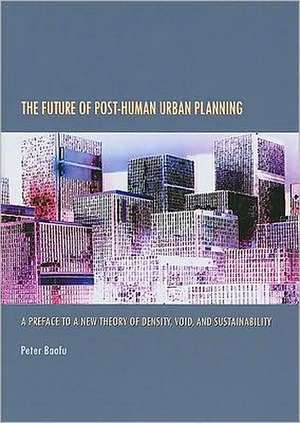The Future of Post-Human Urban Planning: A Preface to a New Theory of Density, Void, and Sustainability
Autor Peter PH. D . Baofuen Limba Engleză Hardback – 31 mai 2009
Preț: 507.45 lei
Preț vechi: 659.03 lei
-23% Nou
Puncte Express: 761
Preț estimativ în valută:
97.13€ • 105.54$ • 81.64£
97.13€ • 105.54$ • 81.64£
Carte indisponibilă temporar
Doresc să fiu notificat când acest titlu va fi disponibil:
Se trimite...
Preluare comenzi: 021 569.72.76
Specificații
ISBN-13: 9781443805919
ISBN-10: 1443805912
Pagini: 403
Dimensiuni: 152 x 211 x 30 mm
Greutate: 0.64 kg
Editura: Cambridge Scholars Publishing
ISBN-10: 1443805912
Pagini: 403
Dimensiuni: 152 x 211 x 30 mm
Greutate: 0.64 kg
Editura: Cambridge Scholars Publishing
Notă biografică
Dr. Peter Baofu is the author of 23 books (with some more to appear in 2009), which proposes 34 new theories on the mind, nature, society, and culture - ranging from the social sciences through the humanities and the formal sciences to the natural sciences. He is known for his pioneering works on "post-humanity," "comprehensive creative thinking," "post-capitalism," "selective geometry," "post-democracy," "contrastive advantages," "ambivalent technology," "authoritarian liberal democracy," "the post-post-Cold-War era," "post-civilization," "transformative aesthetic experience," "synthetic information architecture," "contrastive mathematical logic," "dialectic complexity," "after-postmodernity," "sophisticated methodological holism," "post-human space-time," "existential dialectics," "unfolding unconsciousness," "floating consciousness," "hyper-spatial consciousness," and so on. Dr. Baofu earned an entry to the list of "prominent and emerging writers" in Contemporary Authors (2005) and another honorary entry in The Writers Directory (2007) - and was also interviewed on television and in newspapers about his ideas. He was a U.S. Fulbright Scholar in the Far East. He had taught as a professor at different universities in Western Europe, the Caucasus, the Middle East, the Balkans, Central Asia, and North America. He finished more than 5 academic degrees, including a Ph.D. from M.I.T., and was a summa cum laude graduate.
